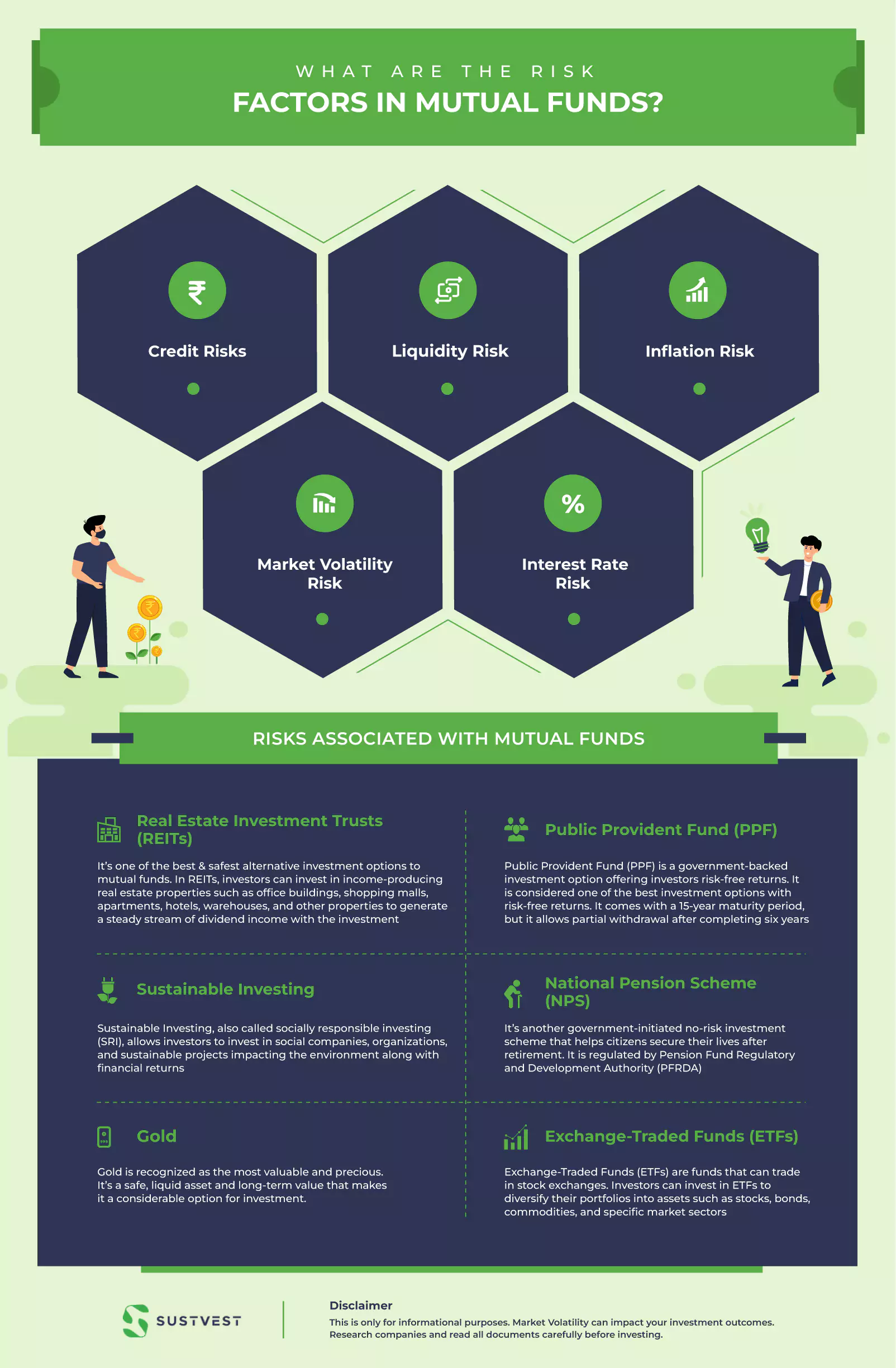Mutual funds are no longer the choice of many investors. There are various risks and uncertainties associated with this field, such as market volatility, additional fees and expenses, lack of portfolio control, and lack of flexibility in investing.
If you’re tired of these traditional investment options and looking for a better alternative to mutual funds, you’re at the right place. At SustVest, we guide you and provide the best investment option to build your strong portfolio and give higher returns.
In this article, we’ve done our in-depth research and deep dive into the best alternative to mutual funds that you can consider based on your goals and risk appetite.

What are the Risk Factors in Mutual Funds?
Investing in mutual funds comes with various risks, not in the investor’s control, which is why many are trying to find an alternative to mutual funds. Here are some main risk factors that every investor must know:
1. Market Volatility Risk
Surely you’ve heard this disclaimer “mutual funds are subjected to market risk” in their advertisements. It’s a true slogan that shows investors can lose their investments when the market performs poorly. There are fluctuations in market conditions based on economic trends, geopolitical, and impact of funds performance. So investors can gain or lose in this market.
2. Liquidity Risk
Liquidity is one of the essential things that help investors convert their assets into cash immediately when needed. However, mutual funds have liquidity risk means if investors want to sell their shares, they may sell at unfavorable prices that lower the returns.
3. Interest Rate Risk
Changes in interest rates can impact investment; if the interest rate rises, the value of bonds with lower interest rates decreases, and if the interest rate is lower, then the value of equities decreases, and bond value increases.
4. Credit Risks
Credit risk mainly affects companies that have issued debt. When the issuer fails to pay the promised interest, it is a worthless investment for investors. However, credit risk comes with various factors, such as the borrower’s creditworthiness, financial history, and making timely payments. If the borrower doesn’t pay, it lowers the credit rating and increases the interest rate.
5. Inflation Risk
Another major risk that comes in mutual funds, i.e., Inflation risk. Due to inflation risk, various investors are considering other investment options where they get higher returns than mutual funds. For example – if the inflation rate is 6% and mutual fund investors are getting an 8% return, then the actual return is 2% only.

Some of the Top Alternative Investment Options to Mutual Funds
Here are some of the top alternative to mutual funds:
1. Real Estate Investment Trusts (REITs)
It’s one of the best & safest alternative investment options to mutual funds. In REITs, investors can invest in income-producing real estate properties such as office buildings, shopping malls, apartments, hotels, warehouses, and other properties to generate a steady stream of dividend income with the investment.
It allows investors to diversify their portfolio in various properties and lower the risks with higher returns. REITs generate income through rent payments and provide some portion to shareholders as a dividend. This way, investors build a diversified portfolio, generating dividend income and capital appreciation.
Check out our blog for the 7 Best Investment Options in India here.
2. Public Provident Fund (PPF)
Public Provident Fund (PPF) is a government-backed investment option offering investors risk-free returns. It is considered one of the best investment options with risk-free returns. It comes with a 15-year maturity period, but it allows partial withdrawal after completing six years.
However, investors can use their PPF balance to take a loan because it comes under the EEE category of tax savings. Under section 80C of the Income Tax Act 1961, investors are eligible for tax deductions due to contributions in PPF accounts.
It also gives higher interest rates than other fixed investment options. Every quarter, the interest is revised and paid to investors. It’s a good investment option for risk-free, stable returns with long-term profitability.
3. Sustainable Investing
Sustainable Investing, also called socially responsible investing (SRI), allows investors to invest in social companies, organizations, and sustainable projects impacting the environment along with financial returns. So it allows investors to get financial as well as social returns.
Sustainable Investing is a new concept that attracts various young investors to invest for a better future and maximize capital.
Some of the most popular sustainable areas that generate higher returns and give positive social impact are – solar panels, wind turbines, electric vehicles (EVs), sustainable agriculture, and green building.
These are the fastest-growing areas where investors can invest in generating higher returns and positive social impact.
However, it’s not easy to start sustainable investing without expert guidance. At SustVest, we guide you to make informed investment decisions that align with your values and generate positive financial and social returns.
4. National Pension Scheme (NPS)
It’s another government-initiated no-risk investment scheme that helps citizens secure their lives after retirement. It is regulated by Pension Fund Regulatory and Development Authority (PFRDA).
Under the NPS scheme, you can invest in various government bonds, equity, and other investment options and grow for retirement. It gives a yearly interest rate of 8-10%. It allows you to invest in different assets per your flexibility and create a diversified portfolio.
5. Gold
Gold is recognized as the most valuable and precious. It’s a safe, liquid asset and long-term value that makes it a considerable option for investment.
Different ways are available to buy gold, such as physical gold coins or bars, gold exchange-traded funds (ETFs), or investing in gold mining stocks or bonds.
However, the short-term return to gold is not predictable, but the long-term value will always be higher. So before investing in gold, you should assess the risk, investment required, and overall return expectations.
6. Exchange-Traded Funds (ETFs)
Exchange-Traded Funds (ETFs) are funds that can trade in stock exchanges. Investors can invest in ETFs to diversify their portfolios into assets such as stocks, bonds, commodities, and specific market sectors.
It’s a better alternative investment option with diversification, flexibility, transparency, lower expense ratios, and tax efficiency, making this option considerable and getting better returns.
There are many alternative to mutual funds, one of which is investing in renewable energy. Read on about Investing in Renewable Energy here.
FAQ: Alternative to Mutual Funds
Q.1 Which Investment Option is best for me?
The best alternative to mutual funds for higher returns and long-term profitability with lower risk is investing in sustainable projects such as solar panels, wind turbines, electric vehicles, and other renewable energy products. It’s a growing field that helps investors to get financial and social returns.
Q.2 Is it too risky to invest in stocks?
Investing in stocks comes with a risk because it’s a fluctuating market. So before investing in stocks, you need to assess your risk appetite.
Q.3 What do you mean by portfolio diversification?
It means investing in different assets and diversifying the portfolio. It helps in reducing the risks and gives higher returns.
Q.4 Is it good to choose a long-term investment option?
Choosing a long-term investment can be beneficial because it helps you to avoid short-term fluctuations and use compounding to get long-term profitability that creates wealth.
Q.5 Why should I assess risk tolerance before investing money?
Risk assessment is the essential parameter every investor must consider before investing so that you can invest according to calculated risk without facing challenges.
Conclusion
Overall these are the best alternatives to mutual funds that you can consider for getting higher returns and long-term stability. You must select any alternative investment option that gives you higher returns, such as sustainable investing, and diversify your portfolio to lower risks and generate positive returns. However, investing in a new market comes with various challenges that require expert guidance. Get in touch with Sustvest for guidance.

Founder of Sustvest
Hardik completed his B.Tech from BITS Pilani. Keeping the current global scenario, the growth of renewable energy in mind, and people looking for investment opportunities in mind he founded SustVest ( formerly, Solar Grid X ) in 2018. This venture led him to achieve the ‘Emerging Fintech Talent of the Year in MENA region ‘ in October 2019.




